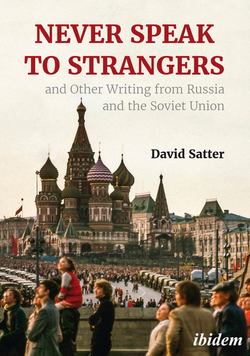Читать книгу Never Speak to Strangers and Other Writing from Russia and the Soviet Union - David Satter - Страница 26
На сайте Литреса книга снята с продажи.
ОглавлениеERZEUGT DURCH JUTOH - BITTE REGISTRIEREN SIE SICH, UM DIESE ZEILE ZU ENTFERNEN
Financial Times, Tuesday, May 1, 1979
David Satter examines the latest
U.S.-Soviet prisoner exchange
Moscow Yields to ‘Interference’
The largest exchange of prisoners ever arranged between the U.S. and the Soviet Union has confirmed that despite its protest, Moscow now accepts that foreign “interference” in Soviet internal affairs is an established fact.
East-West prisoner exchanges have, of course, occurred before, beginning with that in 1962 of Gary Powers, the U-2 spy pilot, for the Soviet agent Rudolf Abel. But last week’s exchange of two Soviet spies for five Soviet dissidents represented the first time that the Soviet Union has agreed to retrieve two of its spies by granting freedom, not to foreign-agents, but to five of its own citizens.
Despite the extra difficulty of discouraging dissent when prominent dissidents are freed from prison and sent to the West, last week’s events could also lead to further exchanges resulting in freedom for Anatoly Shcharansky and Dr. Yuri Orlov, two prominent members of the group which tried to monitor Soviet observance of the Helsinki accords.
When Mr. Leonid Zamyatin, a top Kremlin spokesman, was asked on Saturday, following Soviet-French talks, about the effect of the exchange on detente, he replied angrily that detente was a question of major issues and he had nothing to say to those who saw detente in such narrow terms.
However, it was almost certainly with an eye to the SALT 2 arms treaty and the effect of Soviet treatment of dissidents on Western public opinion, that plans were made for the release of the dissidents. Although they were traded for convicted spies, there was nothing in the charges against any of them to show they had ever had any connection with a foreign power.
The best known of them is Alexander Ginzburg, a veteran Soviet dissenter who has been in and out of labour camps since the 1950s, and was sentenced to eight years imprisonment in a special-regime labour camp last July after being convicted of anti-Soviet agitation and propaganda.
Mr. Ginzberg was, with Mr. Shcharansky and Dr. Orlov, a member of the now all but suppressed Helsinki monitoring group. But the principal charge against him was that he helped to distribute copies of “The Gulag Archipelago,” Alexander Solzhenitsyn’s history of the Soviet labour camp system.
The two Jewish dissidents who were freed, Mark Dymshits and Edward Kuznetsov, were also jailed on charges which had nothing to do with espionage. They were sentenced to death in 1970 for their part in an unsuccessful attempt to commandeer a light aircraft at Leningrad Airport and to fly it to Sweden from where they hoped to go to Israel.
The sentences were later reduced to 15 years’ imprisonment after widespread international protests. In 1971, Mr. Kuznetsov’s “Prison Diaries” were published in the West. Five other Jews involved directly or indirectly in what became known as the “Leningrad Affair,” were released from prison earlier this month during the visit to the Soviet Union of a delegation of U.S. Congressmen.
Another of those exchanged, Mr. Valentin Moroz, was a Ukrainian historian jailed in 1970 for anti-Soviet propaganda. After six years in prison, Mr. Moroz was moved to an institute of criminal psychiatry. When the move was announced, 20 U.S. Senators called on Mr. Leonid Brezhnev, the Soviet President, to allow Mr. Moroz to take up a post at Harvard University.
The last of the exchanged dissidents was Georgi Vins, leader of a faction which broke away from the officially sanctioned Baptist Church. He was jailed for inciting Soviet citizens to illegal actions. Just as he was about to be released last month, dissident sources said he had been sent back for a long prison term in Siberia after being held for seven weeks in a Moscow jail.
All five were convicted according to the normal operation of Soviet law and the exchange appears to mean that the long-standing subordination of the Soviet legal process to the political interests of the state can now be extended to include subordination to the desires and pressures of foreign states as well.
The five dissidents arrived in New York, amid intense publicity but the Soviet media carried no news of the return to Moscow of Valdik Enger and Rudolf Cheryayev, the two Soviet employees of the United Nations who were sentenced to 50 years each in New Jersey last October for receiving secret naval documents from a double agent.
It is believed that negotiations for the release of Mr. Shcharansky, and possibly Dr. Orlov, are taking place. It is speculated that a second exchange may be timed for a strategic moment to ease Senate ratification of the SALT 2 agreement.
Most observers believe that the release of other prominent dissidents will have a good effect on U.S.-Soviet relations but this remains only one of the factors that the Soviet authorities must bear in mind.
They may want good relations with the West, but releasing political prisoners to get it makes the consequences of dissent less frightening and affirms that the Soviet Union is not as resolute in rejecting attempts at outside interference in the legal process as it would like others to believe.
.
